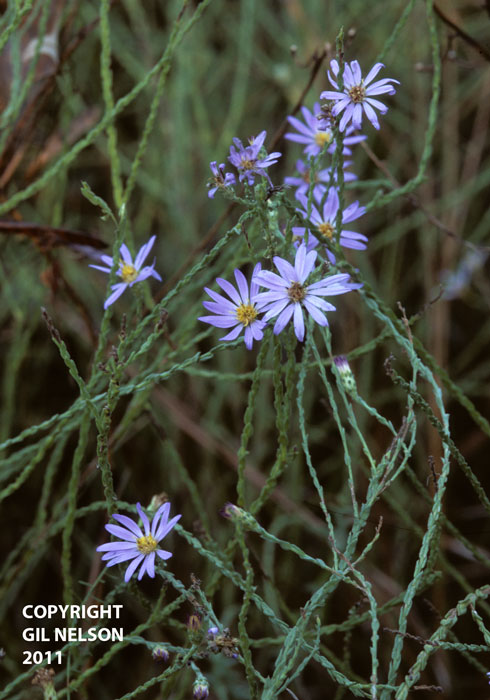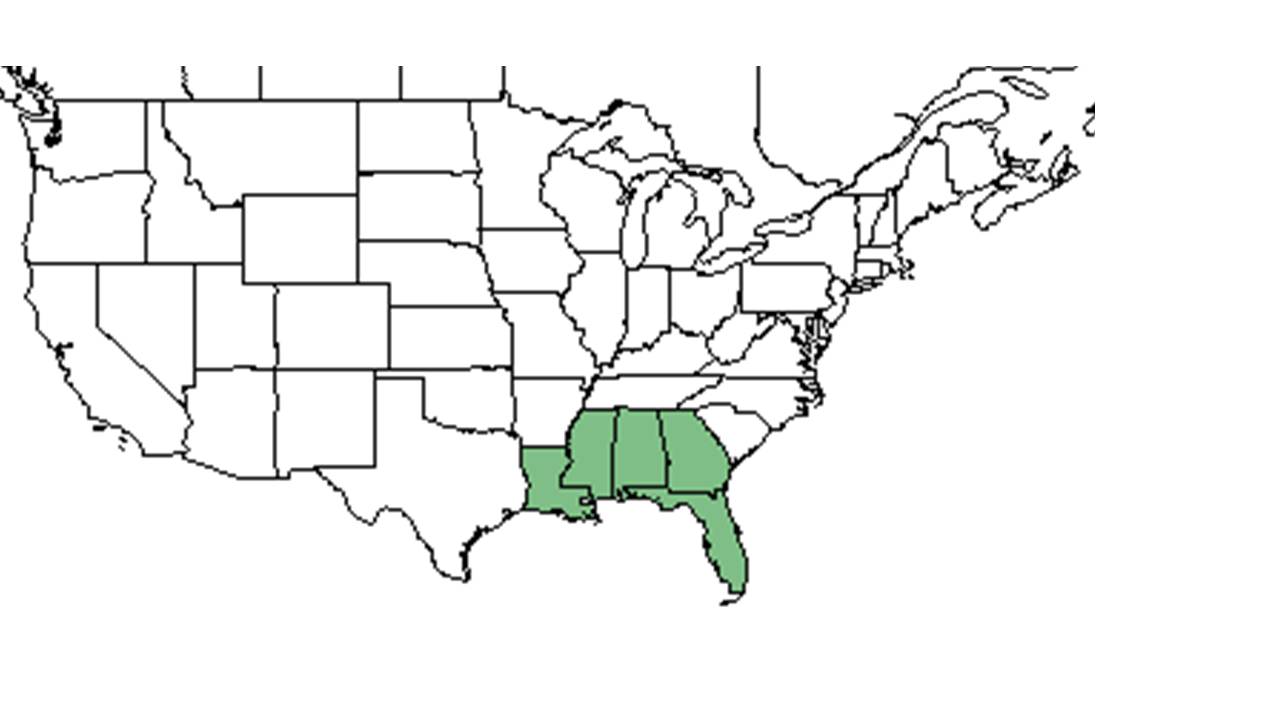Difference between revisions of "Symphyotrichum adnatum"
(→Seed dispersal) |
|||
| Line 27: | Line 27: | ||
==Ecology== | ==Ecology== | ||
===Habitat=== <!--Natural communities, human disturbed habitats, topography, hydrology, soils, light, fire regime requirements for removal of competition, etc.--> | ===Habitat=== <!--Natural communities, human disturbed habitats, topography, hydrology, soils, light, fire regime requirements for removal of competition, etc.--> | ||
| − | In the Coastal Plain in Florida and Georgia, ''S. adnatum'' can be found in longleaf pine savannas, pine flatwood communities, annually burned pinelands, slash pine plantations, and open mixed woodlands | + | In the Coastal Plain in Florida and Georgia, ''S. adnatum'' can be found in longleaf pine savannas, pine flatwood communities, annually burned pinelands, slash pine plantations, and open mixed woodlands. <ref name=fsu> Florida State University Robert K. Godfrey Herbarium database. URL: http://herbarium.bio.fsu.edu. Last accessed: July 2015. Collectors: Loran C. Anderson, Robert K. Godfrey, Leon Neel, R. A. Norris, R. Komarek, Kathleen Craddock Burks. States and Counties: Florida: Bay, Leon, Wakulla, Walton. Georgia: Thomas. Compiled by Tall Timbers Research Station and Land Conservancy. </ref> It is restricted to native groundcover with a statistical affinity in upland pinlands of South Georgia. <ref name=oster> Ostertag, T.E., and K.M. Robertson. 2007. A comparison of native versus old-field vegetation in upland pinelands managed with frequent fire, South Georgia, USA. Pages 109–120 in R.E. Masters and K.E.M. Galley (eds.). Proceedings of the 23rd Tall Timbers Fire Ecology Conference: Fire in Grassland and Shrubland Ecosystems. </ref> Soil types include loamy sand and sand. <ref name=fsu/> Associated species include ''Euthamia minor, Andropogon virginicus, Eupatorium compositifolium, Gnaphalium obtusifolium, Chamaecrista fasciculata, Chrysopsis mariana, Diodia teres, Sericocarpus tortifolius, Aristida, Ctenium'', and ''Sporobolus''. <ref name=fsu/> |
===Phenology=== <!--Timing off flowering, fruiting, seed dispersal, and environmental triggers. Cite PanFlora website if appropriate: http://www.gilnelson.com/PanFlora/ --> | ===Phenology=== <!--Timing off flowering, fruiting, seed dispersal, and environmental triggers. Cite PanFlora website if appropriate: http://www.gilnelson.com/PanFlora/ --> | ||
Revision as of 17:50, 14 April 2016
| Symphyotrichum adnatum | |
|---|---|

| |
| Photo taken by Gil Nelson | |
| Scientific classification | |
| Kingdom: | Plantae |
| Division: | Magnoliophyta – Flowering plants |
| Class: | Magnoliopsida – Dicotyledons |
| Order: | Asterales |
| Family: | Asteraceae ⁄ Compositae |
| Genus: | Symphyotrichum |
| Species: | S. adnatum |
| Binomial name | |
| Symphyotrichum adnatum (Nutt.) G.L. Nesom | |

| |
| Natural range of Symphyotrichum adnatum from USDA NRCS Plants Database. | |
Common name: scaleleaf aster
Contents
Taxonomic notes
Description
A description of Symphyotrichum adnatum is provided in The Flora of North America.
Distribution
Ecology
Habitat
In the Coastal Plain in Florida and Georgia, S. adnatum can be found in longleaf pine savannas, pine flatwood communities, annually burned pinelands, slash pine plantations, and open mixed woodlands. [1] It is restricted to native groundcover with a statistical affinity in upland pinlands of South Georgia. [2] Soil types include loamy sand and sand. [1] Associated species include Euthamia minor, Andropogon virginicus, Eupatorium compositifolium, Gnaphalium obtusifolium, Chamaecrista fasciculata, Chrysopsis mariana, Diodia teres, Sericocarpus tortifolius, Aristida, Ctenium, and Sporobolus. [1]
Phenology
It has been observed to flower and fruit November and December (FSU Herbarium).
Seed dispersal
According to Kay Kirkman, a plant ecologist, this species disperses by wind. [3]
Seed bank and germination
Fire ecology
Pollination
Use by animals
Diseases and parasites
Conservation and Management
Cultivation and restoration
Photo Gallery
References and notes
Florida State University Robert K. Godfrey Herbarium database. URL: http://herbarium.bio.fsu.edu. Last accessed: July 2015. Collectors: Loran C. Anderson, Robert K. Godfrey, Leon Neel, R. A. Norris, R. Komarek, Kathleen Craddock Burks. States and Counties: Florida: Bay, Leon, Wakulla, Walton. Georgia: Thomas. Compiled by Tall Timbers Research Station and Land Conservancy.
Ostertag, T.E., and K.M. Robertson. 2007. A comparison of native versus old-field vegetation in upland pinelands managed with frequent fire, South Georgia, USA. Pages 109–120 in R.E. Masters and K.E.M. Galley (eds.). Proceedings of the 23rd Tall Timbers Fire Ecology Conference: Fire in Grassland and Shrubland Ecosystems.
- ↑ 1.0 1.1 1.2 Florida State University Robert K. Godfrey Herbarium database. URL: http://herbarium.bio.fsu.edu. Last accessed: July 2015. Collectors: Loran C. Anderson, Robert K. Godfrey, Leon Neel, R. A. Norris, R. Komarek, Kathleen Craddock Burks. States and Counties: Florida: Bay, Leon, Wakulla, Walton. Georgia: Thomas. Compiled by Tall Timbers Research Station and Land Conservancy.
- ↑ Ostertag, T.E., and K.M. Robertson. 2007. A comparison of native versus old-field vegetation in upland pinelands managed with frequent fire, South Georgia, USA. Pages 109–120 in R.E. Masters and K.E.M. Galley (eds.). Proceedings of the 23rd Tall Timbers Fire Ecology Conference: Fire in Grassland and Shrubland Ecosystems.
- ↑ Kay Kirkman, unpublished data, 2015.